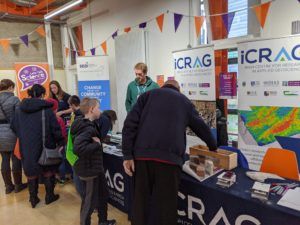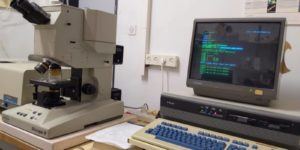Profile
Danny Hnatyshin
My CV
-
Education:
I went to the University of Alberta in Canada
-
Qualifications:
I have a PhD, specialized in geology
-
Work History:
I worked as a geoscience teaching assistant and chemistry laboratory technician at the University of Alberta in Canada
-
Current Job:
I currently work as a geochemistry researcher at University College Dublin
-
About Me
I am a easy going person who enjoys the outdoors, plays sports, and has a cool job!
-
Read more
I currently live in Dublin, but I originally grew up in the Rocky Mountains in the small tourist town of Jasper in Canada. I always loved playing sports, and because I am from Canada, ice hockey is my favorite. A lot my hobbies revolve around the outdoors, and include activities hiking, camping, and cycling are something I have always done. I was interested in science at a young age, where I couldn’t get enough of dinosaurs and space. I chose to go to university because I wanted to pursue science as a job. I picked geology since I was always interested in how the Earth worked. And obviously things like volcanoes are just cool!
-
Read more
As a geologist I collect rocks that might be interesting or important to study. For example we might find rocks that have dinosaur bones in it, or may contain interesting things like gold or diamonds. I specialize in figuring out how old rocks are, which means I spend a lot of time working in chemistry laboratories and working with expensive scientific equipment.
One thing a geologist or a paleontologist might want to know is how long a animal like a dinosaur lived. To do this we collect the rocks that contain the bones. We can then use some fancy chemistry to figure out how old those rocks are, which then tell us how old the bones might be.
In Ireland we also are interested in finding new sources of metals used in construction and electronics. To do this we need to find clues to help us locate new resources. One way we can do this is figuring out what kind of rocks we find metals in and how old the rocks they are found in are. We can then go out and look at rocks of similar characteristics to see if we find more metal.
My job is often broken down into two different sections. The first part of any project is to go out and find the rocks that are interesting. That means geologists often travel all over the world, which is a great thing if you like to travel and work in the outdoors.
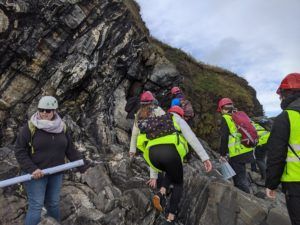
After we collect the rock samples, we bring it back to the research lab to study.
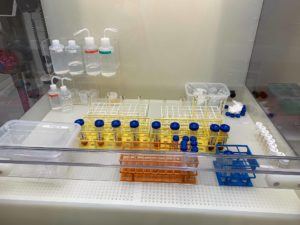
To figure out how old a rock is we often first dissolve the rock in acid (similar how salt/sugar can dissolve in water). Which we then use special chemistry to prepare the sample for analysis.
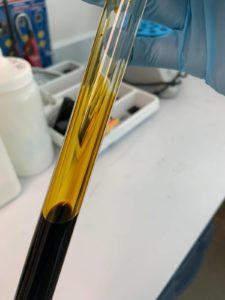
We use special instruments and computers to measure what the rock was made from. Using some ideas from physics we can calculate the age of the rock!
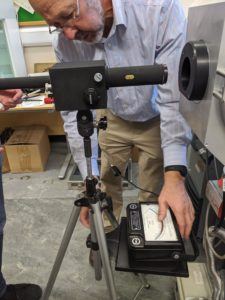
-
My Typical Day
Everyday is a bit different, but after I get up in the morning (not too early!) I usually cycle into university, pick out some rocks and set up experiments in the geochemistry lab! After finishing up work I usually go play sports or play games.
-
Read more
A typical outline in my geochemistry research program works as follows:
Prior to arriving at university for the day I would have previously prepared broad outline of the research that will be done for the day.
Once I arrive at the university and head down to the geochemistry laboratory and gather all the material and samples needed to run my experiments for the day.
Since my research involves determining how old rocks are week is quite different:
Week 1: Select samples of interest and look at them under a regular microscope or electron microscope to properly identify what my rock is made from.
Week 2: After selection of the best samples I have to crush and purify my rocks so they can be brought to the geochemistry laboratory. I crush my rocks either with a sledge hammer or using specialized crushing equipment. I can remove impurities using a special magnet that removes magnetic minerals that I may or may not want to work with.
Week 3-4: I bring my samples to the geochemistry lab where I dissolve my samples in acid. I then use special chemistry procedures to prepare my samples for isotope analysis. Isotope analysis is the specialized analysis that you have to do to figure out how old a rock is. The simple version of this is that it is a way to measure the radioactivity of a rock. All rocks are slightly radioactive! Since radioactivity decreases over time the older the rock the less radioactive it will be.
Week 5: The specially prepared samples are brought to an instrument called a mass spectrometer. This will produce the data needed to determine the age of the rock.
-
What I'd do with the prize money
I would love to convert some of my notes, research, and science knowledge into video format (e.g. YouTube videos).
-
My Interview
-
How would you describe yourself in 3 words?
Fun, Reliable, Efficient
What did you want to be after you left school?
A scientist or engineer
Were you ever in trouble at school?
Nope!
Who is your favourite singer or band?
Breaking Benjamin
What's your favourite food?
Chocolate
What is the most fun thing you've done?
Climbing mountains
If you had 3 wishes for yourself what would they be? - be honest!
Stay healthy forever, be better at sports, and obviously more wishes!
-
-
Work photos:


